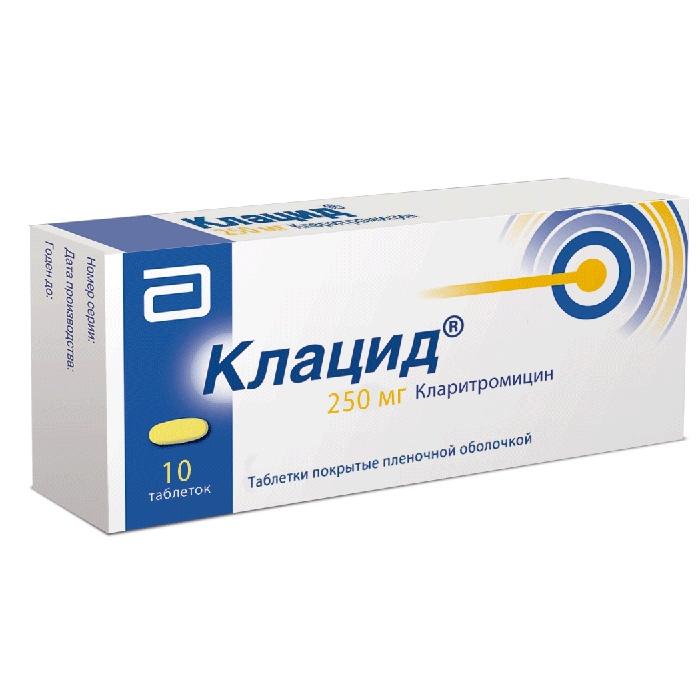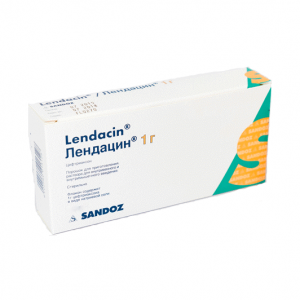Description
release form
coated tablets
Packing
10 pcs
Pharmacological action
Klacid is an antibiotic of the macrolide group. Clarithromycin inhibits protein synthesis in a microbial cell by interacting with the 50S ribosomal subunit of bacteria.
Highly active against a wide range of aerobic, anaerobic, gram-positive and gram-negative bacteria. Clarithromycin showed high in vitro activity against standard and isolated bacterial cultures. Highly effective against many aerobic and anaerobic gram-positive and gram-negative microorganisms. In vitro studies confirm the high efficacy of clarithromycin against Legionella pneumophila and Mycoplasma pneumoniae.
drug is also active against aerobic gram-positive bacteria: Staphylococcus aureus, Streptococcus pneumoniae, Streptococcus pyogenes, Listeria monocytogenes aerobic gram-negative organisms: Haemophilus influenzae, Haemophilus parainftuenzae, Moraxella catarrhalis, Neisseria gonorrhoeae other microorganisms: Mycoplasma pneumoniae, Chlamydia pneumoniae (TWAR), Chlamydia trachomatis , Mycobacterium Mycobacterium leprae, Mycobacterium kansasii, Mycobacterium chelonae, Mycobacterium fortuitum, Mycobacterium avium complex (MAC): Mycobacterium avium, Mycobacferium intracellulare.
Enterobacteriaceae, Pseudomonas spp., as well as other lactose-free gram-negative bacteria are insensitive to clarithromycin. The production of b-lactamase does not affect the activity of clarithromycin. Most strains of staphylococci resistant to methicillin and oxacillin are resistant to clarithromycin.
Indications
Infectious and inflammatory diseases caused by microorganisms sensitive to the drug: – upper respiratory tract infections (pharyngitis, tonsillitis and sinusitis)
– lower respiratory tract infections (bronchitis, pneumonia)
– mild otitis sarditis tissues (impetigo, folliculitis, cellulitis, abscesses)
– disseminated or localized mycobacterial infections caused by Mycobacterium avium or Mycobacterium intracellulare
– localized infections caused by Mycobacterium fortuitum, Mycobacteri um kansasii, Mycobacterium chelonae.
Contraindications
– severe renal impairment (with CC less than 30 ml / min), clarithromycin quick release
is prescribed for such patients – concomitant use of astemizole, cisapride, pimozide, terfenadine
– porphyria srdrdkp pregnancy – lactation – pregnancy hypersensitivity to antibiotics of the macrolide group.
Composition
1 tablet contains clarithromycin 250 mg
Dosage and administration
The average oral dose for adults is 250 mg 2 times / day. If necessary, you can assign 500 mg 2 times / day. The duration of treatment is 6-14 days.
For the treatment of infections caused by Mycobacterium avium, Klacid is prescribed orally – 1 g 2 times / day. The duration of treatment may be 6 months or more.
Side effects of
From the cardiovascular system: rarely – ventricular arrhythmia, including ventricular tachycardia (with an increase in the QT interval).
From the digestive system: nausea, abdominal pain, vomiting, diarrhea, gastralgia, pancreatitis, glossitis, stomatitis, oral candidiasis, discoloration of the tongue and teeth rarely – pseudomembranous enterocolitis. Dental discoloration is reversible and is usually restored by professional brushing at the dentist. Dysfunction of the liver was rarely observed, including increased activity of liver enzymes, hepatocellular and / or cholestatic hepatitis with or without jaundice. These liver dysfunctions can be severe, but they are usually reversible. Cases of liver failure and death have been very rare, mainly due to severe concomitant diseases and / or concomitant drug therapy.
From the side of the central nervous system: transient headaches, dizziness, anxiety, insomnia, nightmares, tinnitus, depersonalization, hallucinations, cramps, a feeling of fear rarely – psychosis, confusion in some cases – hearing loss (when you stop taking clarithromycin, your hearing is restored) , change in sense of smell (usually accompanied by distortions in taste).
Allergic reactions: urticaria, flushing of the skin, pruritus, anaphylaxis, Stevens-Johnson syndrome.
From the hemopoietic system: leukopenia, thrombocytopenia.
On the part of laboratory indicators: an increase in blood creatinine is rare – hypoglycemia (while taking hypoglycemic drugs).
Others: development of microbial resistance.
Storage conditions
Keep away from light, inaccessible to children at a temperature not exceeding 30 ° C.
Expiration
3 years.
Deystvuyuschee substances
clarithromycin
Terms of release from
pharmacies by prescription
dosage form
tablets
Appointment
Preschool doctor 12 years, Appointment doctor’s prescription



